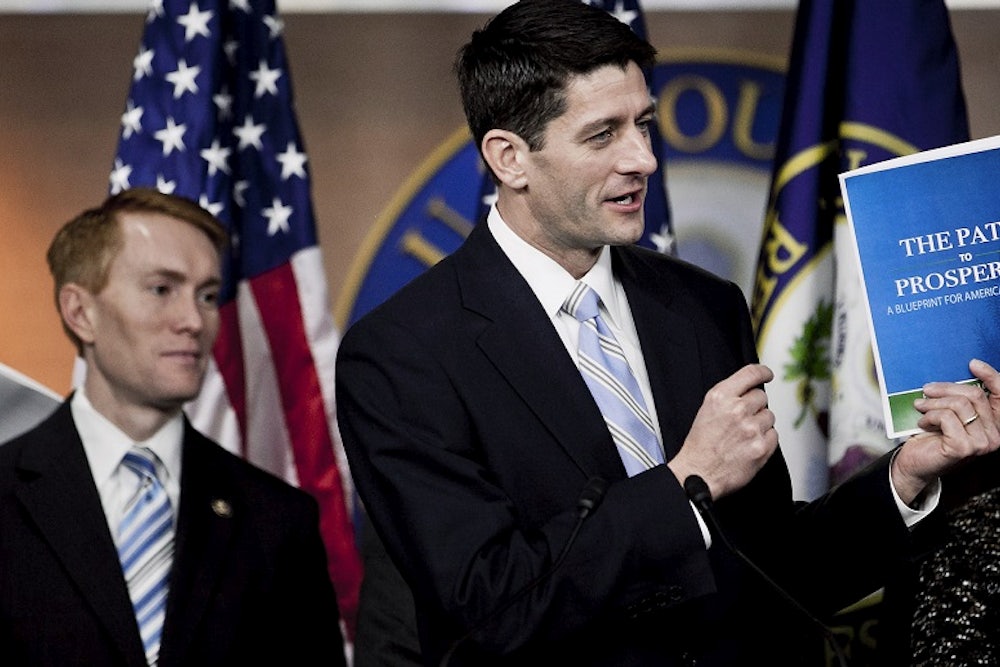Here’s something liberals don’t say very often: Representative Paul Ryan wants to improve the lives of the poor.
Here’s something conservatives don’t say very often: The Ryan budget would hurt the poor.
In some ways, those two descriptions of Ryan seem mutually exclusive. If Ryan wants to help the poor, liberals might ask, how can he not know that his budget would ruin their lives? Conservatives, for their part, might argue that the Ryan budget cannot possibly devastate the poor, because Ryan is trying to help them. Both of these arguments miss a key component of Ryan’s worldview. At the Kirby Center in Washington, D.C., on Tuesday, Ryan laid out that vision.
In the speech, Ryan implicitly outlined the origins of his economic platform and, in particular, the role of the safety net. “Everybody understands the safety net. And everyone benefits from it,” he said. “Take Social Security, we all know how it works or at least how it's supposed to work. When you're working, you pay in. When you're retired, it pays out. Same thing for Medicare.”
But this presents an incomplete picture of the safety net. Social Security and Medicare have been two of the most successful programs in American history at reducing poverty, but those benefits accrue primarily to the elderly. It’s great that America offers most seniors a secure retirement, but that’s only half the purpose of the safety net. The other half helps low-income Americans through programs like the Earned Income Tax Credit, food stamps, and housing assistance. I’m sure Ryan would include these programs as part of the safety net if he was asked to provide an all-inclusive list. But his focus on Social Security and Medicare reveals his true belief that the safety net should provide a secure retirement for everyone, not lift up the poorest Americans.
Why does Ryan believe the safety net should function like this? It is not, as some liberals believe, to hurt low-income Americans. Instead, Ryan has designed a safety net to fit a country where economic opportunity is widely available. Naturally, this was the next part of Ryan’s speech: “You see, the safety net jibes with self-government and progressive bureaucracy does not. The one gives people more control over their lives, while the other takes it away. There's a key principle at work here. The reason you have more control is because you earned it. You paid in. You made the difference. That's the very heart of self-government. We the people are the masters of our own fate.” This is Ryan’s vision for America, in which every person has the opportunity to earn success.
Ryan believes that a much smaller government is necessary to create that environment: Federal programs like food stamps and unemployment insurance disincentivize work and thus trap low-income Americans into a hammock of poverty. Government interference, under this view, is a major impediment to earned success. That may be true for the marginal worker, but for the vast majority of them, it’s false. The lack of wage growth for the bottom quintile of Americans is largely not a result of poorly aligned incentives. It’s the result of loose labor markets that prevent workers from having any leverage over their employers to demand better compensation or working conditions. As economists Jared Bernstein and Dean Baker outline in their e-book Getting Back to Full Employment, lax labor markets have not just plagued the country since 2008, but were a problem long before the financial crisis as well.
Because Ryan misunderstands the underlying causes of poverty, his budget would be an unmitigated disaster for low-income Americans. It would not suddenly spur the poor to find work and magically command higher wages; it will further impoverish them and make them even more desperate. The Center for Budget and Policy Priorities estimates that $3.3 trillion of the spending cuts in the Ryan budget—69 percent—will come from programs for the poor. That includes $137 billion in cuts to the Supplemental Nutrition Assistance Program (SNAP)—aka food stamps—over the next decade. That’s nearly a 20 percent cut. Average SNAP benefits for a family of four were only $489 a month in 2011. That’s not much, and Ryan wants to drastically reduce it.
What’s ironic about Ryan’s economic vision is that he is focused on the idea of self-governance—that each person gets to determine their outcome in life. “The problem with progressivism isn't that it's just more expensive, it's that it undermines self-government,” he said Tuesday. But when jobs are so scarce that workers can’t demand higher wages, they don’t have self-governance. If Ryan really wanted to give low-income Americans the power of self-determination, he would focus on economic policies that create tight labor markets. Only then can they be “masters” of their own fate.
